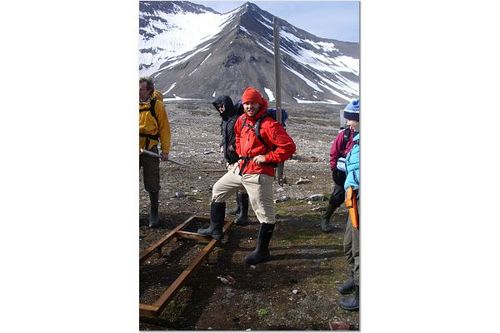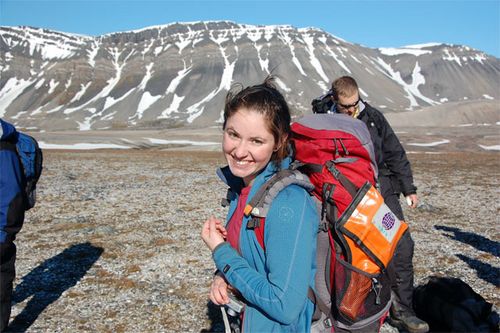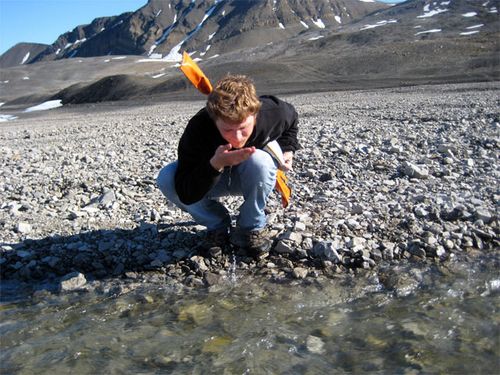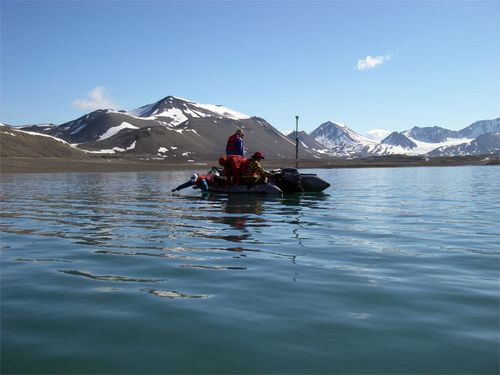Today we begin a two part introduction to the Svalbard REU students and their work. I know you will find them all very fascinating and that they are extremely bright young scientists.
Anthony Novak: A junior at Oregon State University majoring in GeologyThe science that deals with the dynamics and physical history of the earth, the rocks of which it is composed, and the physical, chemical, and biological changes that the earth has undergone or is undergoing. and minoring in Oceanography, Anthony applied to the Svalbard REU Project because it is a "great opportunity to meet people in the science world, research quaternary climate, and be in the Arctic!” His project is titled "Developing a 10Be chronology for glacier fluctuations in Linnevatnet, Svalbard,” where the goal of the project is "to better constrain the ages of older moraines in the valley, which mark deglaciation. Right now there are no real ages for the older moraines, and hopefully my project will fix that.” After college Anthony plans on taking a year off to travel and then pursue a PhD in the paleoceanography. In his free time he enjoys being outside, backpacking, paleoclimatology, climbing, and driving on long road trips to the middle of nowhere.

Kristen Mitchell: A junior at Albion College in Michigan, Kristen is majoring in GeologyThe science that deals with the dynamics and physical history of the earth, the rocks of which it is composed, and the physical, chemical, and biological changes that the earth has undergone or is undergoing. and minoring in Business Management. Kristen applied to this project "for the research experience and to be in such a great setting to do a climate change-related research project.” Her project here is titled "A Comparative Study of Weather Parameters to Glacial Ablation of the Linné GlacierA mass of ice that persists for many years and notably deforms and flows under the influence of gravity. in Svalbard, Norwegian Arctic,” where her goal is "to compare the ablation of the glacier and discharge of its meltwater stream to meteorological factors and develop a model to better understand how specific factors affect glacier ablation.” She plans on attending graduate school after graduating from Albion, and in her free time she enjoys all different types of water sports, lacrosse, basketball, guitar and music. Her favorite high school class was English, her favorite college class was criminology, and her favorite movie is The Guardian.

Emily Mortazavi: Emily is a junior at University of Arizona majoring in GeoscienceStudy of the Earth., more specifically focusing on paleomagnetism. Her project at Kapp Linne is titled "Secular Variation and Environmental Magnetic Reconstruction of Linnèvatnet and Kongressvatnet,” where the goal of the project is "to correlate cores between the two lake basins using their record of earth's magnetic field.” Her plans after college include taking a year off to work at a national park as a resident geologist and then head off to graduate school to begin a career in academia. Her favorites include AP History in high school because her fantastic teacher and her field geology class in college because of the people and the content of the course. She likes hiking, geology, paleomagnetism, napping, and ALL types of music.

David Pompeani: David is a junior at the University of Pittsburgh where he is majoring in GeologyThe science that deals with the dynamics and physical history of the earth, the rocks of which it is composed, and the physical, chemical, and biological changes that the earth has undergone or is undergoing. and Planetary ScienceThe area of science of or pertaining to the planets; as, planetary inhabitants; planetary motions; planetary year, or a particulat planet, such as Earth., and he applied to the Svalbard REU program to use science to help us understand the workings of our planet. His project is titled "Biochemical Changes of Lake Sediment Used as a Proxy Indicator of Climate ChangeA statistically significant variation in either the mean state of the climate or the mean variability of the climate that persists for an extended period (typically 10 years or more). Climate change may result from such factors as changes in solar activity, long-period changes in the Earth's orbital elements, natural internal processes of the climate system, or anthropogenic forcing (for example, increasing atmospheric concentrations of carbon dioxide and other greenhouse gases). during the Late HoloceneThe time period beginning at the end of the last Ice Age about 11,000 years ago and characterized by the development of human civilizations. in Kapp Linne’, SpitsbergenSpitsbergen is the largest island in the Norwegian High Arctic archipelago of Svalbard. To see a map of Spitsbergen and Svalbard click here.” where the goal is "to help narrow the timing for the entrance into the LIA and out of the LIA.” David plans on attending graduate school after finishing his studies at the University of Pittsburgh. Some other interesting facts about him include his favorite classes in high school were chemistry and world religions and in college were chemistry and paleoclimatology. He enjoys riding his bike, walking around the parks in Pittsburgh, science, and celebrity gossip, and learning to play the guitar. His favorite music includes the Blues, and music from artists such as Jimi Hendrix, Stevie Ray Vaughn, and groups such as Incubus and Red Hot Chili Peppers. David passes along this quote: "A lake is the landscape's most beautiful and expressive feature. It is Earth's eye; looking into which the beholder measures the depth of his own nature."

Megan Arnold: **Megan is a junior at Bates College **in Maine where she is majoring in GeologyThe science that deals with the dynamics and physical history of the earth, the rocks of which it is composed, and the physical, chemical, and biological changes that the earth has undergone or is undergoing.. After a wonderful experience in Kapp Linne last year Megan caught the "Arctic Bug” and even spent a semester studying in Iceland last fall. From this experience it was only natural for Megan to apply for the Svalbard REU project to continue her data collection. While here in Svalbard she will collect data for her project entitled "Five years of sedimentation in Linnévatnet: analysis of the influences of weather on sedimentation processes” which has the goal "to synthesize the past 5 years of sediment trap data and weather data to give a comprehensive look at how the sedimentation of Linnévatnet has changed.” After graduating, Megan would like to obtain a geology related job working outdoors or doing research for a couple of years before heading off to graduate school. She enjoys traveling, hiking, running, and cross country skiing. In high school her favorite class was Latin and in college in was Limnology.

Tomorrow you will meet the other half of the Svalbard REU 2008 team.


Comments